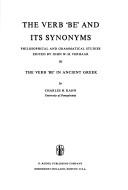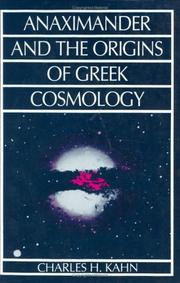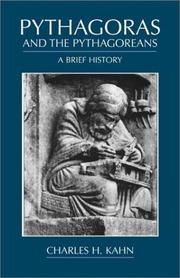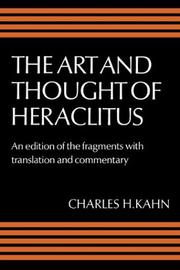| Listing 1 - 10 of 54 | << page >> |
Sort by
|

ISBN: 9027702225 9027703132 9789027702227 9789027703132 Year: 1973 Volume: 16 Publisher: Dordrecht
Abstract | Keywords | Export | Availability | Bookmark
 Loading...
Loading...Choose an application
- Reference Manager
- EndNote
- RefWorks (Direct export to RefWorks)
Classical Greek language --- Grammar --- S38/1535 --- #SML: Nan Huaiyi --- Works not related to China and the Far East--Dictionaries, textbooks, grammar,..: Others --- Eimi (The Greek word) --- Grammar, Comparative and general --- Greek language --- Verb --- Etymology --- Names --- Semantics --- Eimi (The Greek word). --- Verb. --- Names. --- Semantics.

ISBN: 0872202569 0872202550 Year: 1994 Publisher: Indianapolis/Cambridge : Hackett publishing company,
Abstract | Keywords | Export | Availability | Bookmark
 Loading...
Loading...Choose an application
- Reference Manager
- EndNote
- RefWorks (Direct export to RefWorks)

ISBN: 0872205754 0872205762 9780872205758 9780872205765 Year: 2001 Publisher: Indianapolis, Ind. Hackett
Abstract | Keywords | Export | Availability | Bookmark
 Loading...
Loading...Choose an application
- Reference Manager
- EndNote
- RefWorks (Direct export to RefWorks)
Pythagoras and Pythagorean school --- Philosophy, Ancient --- Pythagoras and Pythagorean school. --- Philosophy --- filosofen --- Griekse oudheid --- Pythagoras
Book
ISBN: 9780199534807 0199534802 9780199654352 0199654352 9780191560064 0191560065 9786612126130 6612126132 128212613X 0191608955 1383044694 9780191608957 Year: 2009 Publisher: Oxford New York Oxford University Press
Abstract | Keywords | Export | Availability | Bookmark
 Loading...
Loading...Choose an application
- Reference Manager
- EndNote
- RefWorks (Direct export to RefWorks)
In this series of essays published over 40 years, Charles Kahn explicates the ancient Greek concept of 'being'. His linguistic aim of explaining the meaning of the verb 'einai' is intertwined with his historical and philosophical project of understanding how the concept came to be central to Greek philosophy.
Ontology. --- Einai (The Greek word) --- Philosophy, Ancient. --- Ontologie --- Einai (Le mot grec) --- Philosophie ancienne --- Ontology --- Philosophy, Ancient --- Ancient philosophy --- Greek philosophy --- Philosophy, Greek --- Philosophy, Roman --- Roman philosophy --- Greek language --- Being --- Philosophy --- Metaphysics --- Necessity (Philosophy) --- Substance (Philosophy) --- Etymology
Book
ISBN: 9781107576421 9781107031456 1107031451 9781139381734 9781461953579 146195357X 1139381733 1139892339 1107461251 1107576423 1107472113 1107468507 1107465001 110747311X 1306211808 9781139892339 9781107461253 9781107472112 9781107468504 9781107465008 1107454158 Year: 2013 Publisher: Cambridge Cambridge University Press
Abstract | Keywords | Export | Availability | Bookmark
 Loading...
Loading...Choose an application
- Reference Manager
- EndNote
- RefWorks (Direct export to RefWorks)
Plato's late dialogues have often been neglected because they lack the literary charm of his earlier masterpieces. Charles Kahn proposes a unified view of these diverse and difficult works, from the Parmenides and Theaetetus to the Sophist and Timaeus, showing how they gradually develop the framework for Plato's late metaphysics and cosmology. The Parmenides, with its attack on the theory of Forms and its baffling series of antinomies, has generally been treated apart from the rest of Plato's late work. Kahn shows that this perplexing dialogue is the curtain-raiser on Plato's last metaphysical enterprise: the step-by-step construction of a wider theory of Being that provides the background for the creation story of the Timaeus. This rich study, the natural successor to Kahn's earlier Plato and the Socratic Dialogue, will interest a wide range of readers in ancient philosophy and science.
Plato --- Philosophy --- Ancient & Classical. --- Plato. --- Philosophy. --- Aflāṭūn --- Aplaton --- Bolatu --- Platon, --- Platonas --- Platone --- Po-la-tʻu --- Pʻŭllatʻo --- Pʻŭllatʻon --- Pʻuratʻon --- Πλάτων --- אפלטון --- פלאטא --- פלאטאן --- פלאטו --- أفلاطون --- 柏拉圖 --- 플라톤 --- Platon --- Platoon --- History & Surveys --- Платон --- プラトン --- Arts and Humanities

ISBN: 052128645X 9780521286459 Year: 1987 Publisher: Cambridge Cambridge University Press
Abstract | Keywords | Export | Availability | Bookmark
 Loading...
Loading...Choose an application
- Reference Manager
- EndNote
- RefWorks (Direct export to RefWorks)

ISBN: 1107712912 1107712610 1107719984 1107715857 0511936338 0511627394 9781107719989 9780511627392 0521218837 9780521218832 052128645X 9781107712911 9781107712614 9781107715851 9780511936333 9780521286459 Year: 1979 Publisher: Cambridge [England] New York
Abstract | Keywords | Export | Availability | Bookmark
 Loading...
Loading...Choose an application
- Reference Manager
- EndNote
- RefWorks (Direct export to RefWorks)
Behind the superficial obscurity of what fragments we have of Heraclitus' thought, Professor Kahn claims that it is possible to detect a systematic view of human existence, a theory of language which sees ambiguity as a device for the expression of multiple meaning, and a vision of human life and death within the larger order of nature. The fragments are presented here in a readable order; translation and commentary aim to make accessible the power and originality of a systematic thinker and a great master of artistic prose. The commentary locates Heraclitus within the tradition of early Greek thought, but stresses the importance of his ideas for topical theories of language, literature and philosophy.
Aphorisms and apothegms --- Heraclitus, --- Heraclitus --- Héraclite --- Heraclitus van Efese --- Heraclitus van Ephese --- Herakleitos --- Eraclito --- Eraclito, --- Geraklit, --- Heracleitus, --- Heraclit, --- Héraclite, --- Heraclito --- Hērakleitos, --- Heraklit, --- Herakʻŭlleitʻosŭ --- Kheraklit, --- היראקליטוס --- Ἡράκλειτος, --- Philosophy, Ancient - Early works to 1800 --- Heraclitus Ephesius --- Arts and Humanities --- History --- Aphorisms and apothegms - Early works to 1800 --- Heraclitus, - of Ephesus
Book
ISBN: 0511006896 0511882211 0511585578 9780511006890 9780521648301 0521648300 9780521433259 0521433258 0521433258 0521648300 9780511882210 9780511585579 Year: 1996 Publisher: Cambridge New York Cambridge University Press
Abstract | Keywords | Export | Availability | Bookmark
 Loading...
Loading...Choose an application
- Reference Manager
- EndNote
- RefWorks (Direct export to RefWorks)
This book proposes a new paradigm for the interpretation of Plato's early and middle dialogues. Rejecting the usual assumption of a distinct 'Socratic' period in the development of Plato's thought, this view regards the earlier works as deliberate preparation for the exposition of Plato's mature philosophy. Differences between the dialogues do not represent different stages in Plato's own thinking but rather different aspects and moments in the presentation of a new and unfamiliar view of reality. Once the fictional character of the Socratic genre is recognised, there is no reason to regard Plato's early dialogues as representing the philosophy of the historical Socrates. The result is a unified interpretation of all of the dialogues down to the Republic and the Phaedrus.
Imaginary conversations. --- Conversation, Imaginal --- Conversation, Imaginary --- Dialogues, Imaginal --- Imaginal dialogues --- Conversation --- Dialogues --- Plato. --- Socrates. --- Socrates --- Socrate --- Platon --- Plato --- Aflāṭūn --- Aplaton --- Bolatu --- Platonas --- Platone --- Po-la-tʻu --- Pʻŭllatʻo --- Pʻŭllatʻon --- Pʻuratʻon --- Πλάτων --- אפלטון --- פלאטא --- פלאטאן --- פלאטו --- أفلاطون --- 柏拉圖 --- 플라톤 --- Платон --- プラトン --- Imaginary conversations --- Dialogue --- Philosophy, Ancient --- Conversations imaginaires --- Philosophie ancienne --- History --- Histoire --- Arts and Humanities --- Philosophy --- Sokrates --- Sokrat, --- Sokrates, --- Suqrāṭ, --- Su-ko-la-ti, --- Sugeladi, --- Sokuratesu, --- Sākreṭīsa, --- Socrate, --- سقراط, --- Σωκράτης,
Book
Year: 1960 Publisher: New York (N.Y.): Columbia university press,
Abstract | Keywords | Export | Availability | Bookmark
 Loading...
Loading...Choose an application
- Reference Manager
- EndNote
- RefWorks (Direct export to RefWorks)
Book
Year: 1964 Publisher: New York: Columbia university press,
Abstract | Keywords | Export | Availability | Bookmark
 Loading...
Loading...Choose an application
- Reference Manager
- EndNote
- RefWorks (Direct export to RefWorks)
Cosmology --- Anaximander
| Listing 1 - 10 of 54 | << page >> |
Sort by
|

 Search
Search Feedback
Feedback About UniCat
About UniCat  Help
Help News
News